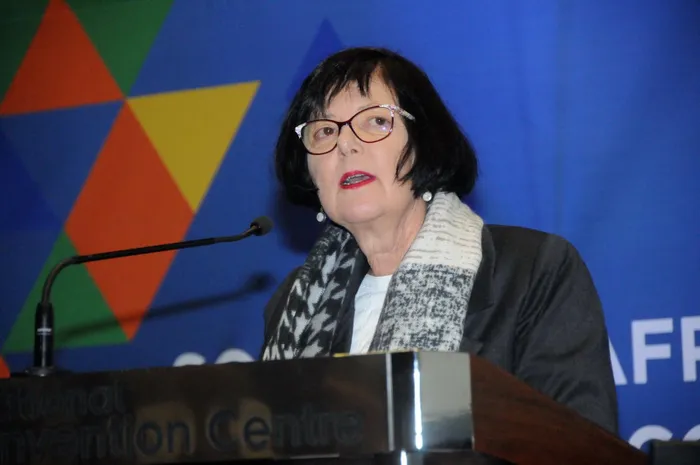Transport Minister champions rail expansion to boost Africa's economy
LOGISTICS

Transport Minister Barbara Creecy said the development of a comprehensive National Rail Master Plan was strategically aligned with the Southern African Development Community (SADC) Regional Rail Master Plan and aimed to guide rail transformation over the next 30 years.
Image: Supplied
Banele Ginidza
Transport Minister Barbara Creecy has set the tone for a transformative approach to rail transport in Africa, urging a shift from mere discussion to tangible delivery.
Speaking at the opening of the Southern African Railways Association (SARA) International Rail Conference 2025 on Tuesday, Creecy positioned rail as a critical driver of continental integration, economic growth, and sustainable mobility.
Creecy said the development of a comprehensive National Rail Master Plan was strategically aligned with the Southern African Development Community (SADC) Regional Rail Master Plan and aimed to guide rail transformation over the next 30 years.
She highlighted the ongoing developments that signify progress in African rail infrastructure, including the Lobito Corridor in Angola, the Nacala Corridor spanning Mozambique and Malawi, the Beitbridge–Bulawayo Railway in Zimbabwe, and the Tazara project that connects Tanzania and Zambia.
These advancements, she stated, were the result of strategic investments and essential policy reforms designed to foster a future filled with high-speed rail projects, urban commuter expansions, and modernised freight corridors.
"Already we are witnessing vital investments in upgrading and expanding rail networks across Africa," Creecy said.
The National Rail Master Plan, once implemented, is expected to complement the SADC's efforts by identifying corridors that require investment and establishing short-, medium-, and long-term investment programmes. Furthermore, the plan will define clear appraisal processes and stakeholder roles to ensure cohesive development.
Creecy reiterated the importance of implementing the National Rail Policy of South Africa, which asserts that rail infrastructure will remain under state ownership while also allowing opportunities for third-party access to rail operations. This policy also underlines the necessity of economic regulation to provide equitable access to the rail network, ensuring efficient management.
Last week, Creecy announced the selection of eleven private sector operators who have successfully met the initial application criteria, securing a total of 41 routes across six corridors for operating periods encompassing up to 10 years.
The Transnet Rail Infrastructure Manager (TRIM) estimates that these new Train Operating Companies (TOCs) have the potential to transport an additional 20 million tons of freight annually starting from the 2026/27 financial year. This development will bolster Transnet Freight Rail’s anticipated volumes and aid the Government's ambition of moving 250 million tons of freight by rail by 2029.
"In September we will launch the Request for Information (RFI) for passenger rail, which will initiate the process of determining the appetite for investment in commuter rail. By recovering our passenger rail capacity, we aim to reach the milestone of 600 million annual passenger journeys on the Prasa network, within five years," Creecy said.
Meanwhile, the Road Freight Association (RFA) has welcomed the announcement of the 11 TOC's, saying the department must ensure that the regulatory environment supports these new entrants.
It also said the department must ensure that the existing rail infrastructure is secured, maintained and improved expediently, and that the collaboration between road and rail is seamless.
"The Road Freight Association will watch developments over the next 12 months with keen interest, and the expectation that the TOCs will start operating in the latter half of 2026," said acting CEO, Kevin van der Merwe.
"Developments such as this have the potential to improve South Africa’s economy through employment opportunities and wealth creation for all its citizens, while positioning South Africa as an efficient, cost-effective, vibrant logistics hub, chain and developmental node for all modes of transport."
The Federation of Unions of South Africa (Fedusa) said that while the department has yet to disclose the specifics of the agreement with the private companies, particularly what the private sector will gain in return for investing in State-Owned infrastructure, it hoped that the department will prioritize transparency in the regulations and contracts that will be established.
"We trust that the minister and the transport department have measures in place to tackle issues such as cable theft and vandalism along railway lines, ensuring that both ongoing and upcoming operations remain unaffected," said Betty Molewa, Fedusa spokesperson.
"The involvement of private companies necessitates that Transnet enhances its efficiency in service delivery to fulfil its promises to contractors."
BUSINESS REPORT